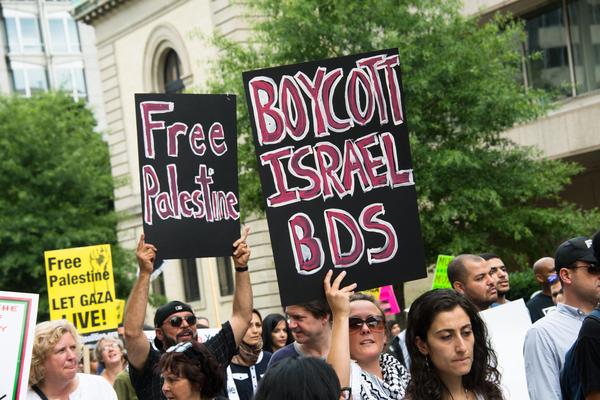U Michigan and The New School restore funding frozen by anti-Zionist factions who seized control of student government and threatened to force BDS policy by crippling school operations.
By Dion J. Pierre, The Algemeiner
The University of Michigan (UM) and The New School in New York City have restored funding to student clubs, following a spending freeze enacted by anti-Zionist factions who seized control of their student governments and vowed to cripple school operations until their demands for a boycott of Israel were met.
As The Algemeiner previously reported, a slew of anti-Zionist candidates at UM secured their election to Central Student Government (CSG) last semester by running as the Shut It Down (SID) party, whose platform promised to sever the university’s ties, both financial and academic, to Israel, according to The Detroit News. Since assuming power, its members have shredded the budget for the summer term approved by the previous administration and vowed to block funding for student clubs during the upcoming fall semester.
Anti-Zionists holding office in The New School’s University Student Senate made similar moves, voting to “halt all external funding until the IC votes in favor of divestment.” The move jeopardized the plans of over 150 registered student clubs.
Both schools have effectively vetoed the decisions and taken charge of financial appropriations, temporarily stripping the student governments of the power of the purse.
“The University of Michigan will make funding available to registered student organizations who apply for funding for the fall semester,” Colleen Mastony, University of Michigan assistant vice president of public affairs, told The Algemeiner on Tuesday. “UM’s vice president for student life and dean of students notified the Central Student Government on August 19 of the decision to immediately institute a temporary funding process. This step was taken at the request of senior leaders within the CSG assembly, after the CSG president in June vetoed a budget resolution that had been passed unanimously by the assembly. The veto impacted the summer budget only. University funding will remain in place until a budget is passed.”
On Monday, The New School announced that it was taking a similar measure.
“To ensure continued access and support for all students on campus, we will temporarily transfer the responsibility of managing this university fee to the Division of Student Success,” a letter to the campus community signed by three high-level officials said. “This decision was made with careful consideration …While we respect any student or student organizations that choose to stand in solidarity with the Student Senate’s decision, it is essential for the university to be able to distribute these resources to our students so that we may enhance campus life and the student experience.”
Anti-Zionist activists on college campuses are already testing university administrations, pushing the boundaries of their conduct and daring a response.
On Monday, anti-Zionists at Cornell University vandalized an administrative building, a provocation which marked an early test of the resolve of its interim president, Michael Kotlikoff, who announced new policies on “institutional neutrality,” discipline, and encampments around the time of incident.
According to the Cornell Daily Sun, the anti-Zionist agitators graffitied “Israel Bombs, Cornell pays” and “Blood is on your hands” on Day Hall. They also shattered the glazing of its front doors.
“We had to accept that the only way to make ourselves heard is by targeting the only thing the university administration really cares about: property,” the students told the Cornell Daily Sun, which agreed to conceal their identities. “With the start of this new academic year, the Cornell administration is trying desperately to upkeep a facade of normalcy knowing that, since last semester, they have been working tirelessly to uphold Cornell’s function as a fascist, classist, imperial machine.”
Kotlikoff’s administration, which said it is “appalled” by the crime, has pledged to hold the culprits responsible.
Earlier this month, two US congressional committees asked 10 of America’s most prestigious universities to disclose their plans for preventing the kind of incident that just occurred at Cornell. Coming amid a congressional investigation of how elite colleges responded to an explosion of antisemitism on college campuses after Hamas’ Oct. 7 massacre across southern Israel, the inquiry demanded an accounting of any new policies that schools such as Harvard University and the University of California, Berkeley have enacted to preclude the possibility that students will, as they did last academic year across the country, illegally occupy or destroy school property and flout rules which proscribe hate speech and racial abuse.
“Last year, many colleges and universities appeared caught off-guard by the protests, disruptions, threats, and encampments that flooded campus, often to the detriment of Jewish students,” Congresswoman Virginia Foxx (R-NC), as well as House Ways and Means Committee chairman Rep. Jason Smith (R-MO), wrote to the schools in a letter. “While that is no excuse for the failures we saw last year, colleges and universities are now acutely aware of the consequences across their campuses that stem from insufficient leadership. Refusals to impose basic discipline, hold bad actors accountable, and restore order on campus in the face of disruptions, violence, and hate will make life worse for all students, including Jewish students.”
